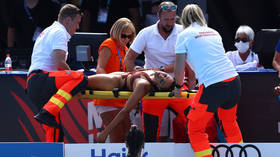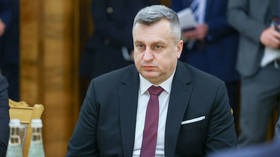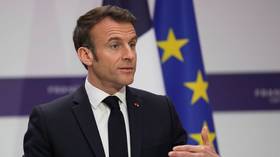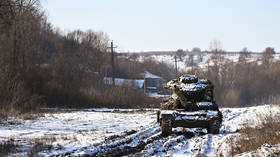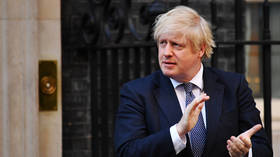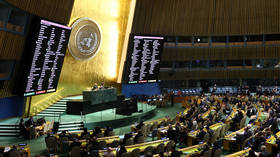Russian star urges ‘deeper’ checks after US swimmer’s pool rescue
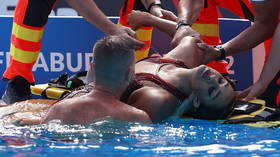
American synchronized swimmer Anita Alvarez must face thorough health examinations to determine the “deeper” reason why she fainted in the pool at the World Championships before being rescued by her coach, according to Russian three-time Olympic champion Alla Shishkina.
The incident in Hungarian capital Budapest on Wednesday shocked the sporting world after dramatic images showed US team coach Andrea Fuentes diving to the bottom of the pool and dragging Alvarez to the surface after she passed out at the end of her routine in the artistic swimming solo free solo.
Fuentes was hailed as a hero for the intervention while it has since been reported that Alvarez, 25, is apparently in good health and could even return to action in the team event on Friday. It was also revealed that the US swimmer had suffered a similar incident in Olympic qualifying in Barcelona last year, when her coach again came to her aid.
Commenting on the disturbing repeat this week, Russian star Shishkina said medical checks must be thorough as the issue might well be “deeper” than simply exhaustion.
“I think the reason must be looked for somewhere deeper,” Shishkina told Sport24.
“Maybe check the vessels of the brain, do an in-depth encephalogram. If a person loses consciousness like this, then obviously not everything is in order, you need to check your health. I hope that everything is all right with Anita, but I would think about a full examination.”
Shishkina, who is a 14-time world champion, said that synchronized swimmers were used to pushing themselves to the physical limits in pursuit of success.
“Athletes are people who, even if it is dangerous to perform, will still do it,” said the 32-year-old.
“I think that Anita will not even think now whether she will survive or not, but will simply perform.”
Shishkina admitted that she had never suffered something similar during her long career.
“I think my self-preservation mode is pretty good. When I felt that there was not enough air at all, I surfaced, despite the fact that I had to finish something. I quickly completed everything and took a breath,” said the star.
Shishkina also ruled out the idea that hot conditions in the pool could have contributed.
“As for hot water, no. This is not the first time competitions have been held in this pool. If it’s hot outside, the water is cool. It is usually 26-27 degrees (Celsius). It’s quite comfortable,” said the Moscow-born star.
“I performed in 2009 in the outdoor pool at the World Championships in Rome, it was +42 (Celsius) outside. And none of our team fainted.”
Elsewhere, Shishkina’s Russian teammate Vlada Chigireva told Match TV that the occurrence with Alvarez was not new.
“It’s terrible, but it happens. It is not for nothing that we have introduced into the regulations that it is impossible to be under water for more than 45 seconds,” said Chigireva, who was part of Russia’s gold medal-winning synchronized swimming teams at the 2016 and 2020 Olympics.
“We have already had cases when a Japanese woman went to the bottom after the group program at the Olympics. This happened often. Yes, it's terrible, but it's true. This is a sport, open water.
“Maybe she became hot or it coincided with some not the best state of health. In the semi-finals, [Alvarez] did the same solo with the same difficulty, made it to the end and was fine.”
Chigireva revealed that she had finished her Olympic routine in Rio at her physical limit.
“In Rio, I finished the program in the ‘darkness’. I didn’t see anything, I was looking for support by touch – from the sun, from overworking, my body and brain switched off. I got out, took a breather and came to my senses,” said the 27-year-old.
US team coach Fuentes, who was a four-time Olympic medal winner with her country Spain, said after the incident that doctors had done a full check of Alvarez.
“We have looked at many things and the pressure is good. We’ve done a CT scan on her brain, she’s fine,” said the 39-year-old coach.
“In our sport it happens sometimes, when we go without breathing for a long time, with very high pulses and sometimes the oxygen not getting where it has to get, we faint.
“But it is that we spend many hours in sync. What happens is, we do exercises to endure as much as possible for the competition, and today it happened during the competition.”
In a video posted on Friday, two-time Olympian Alvarez reassured fans that she was “okay and healthy!” while a video showed her eating with teammates.
The swimmer did not rule out competing in the remaining two days of competition in Budapest, but said that decision would be determined by “expert medical staff.”
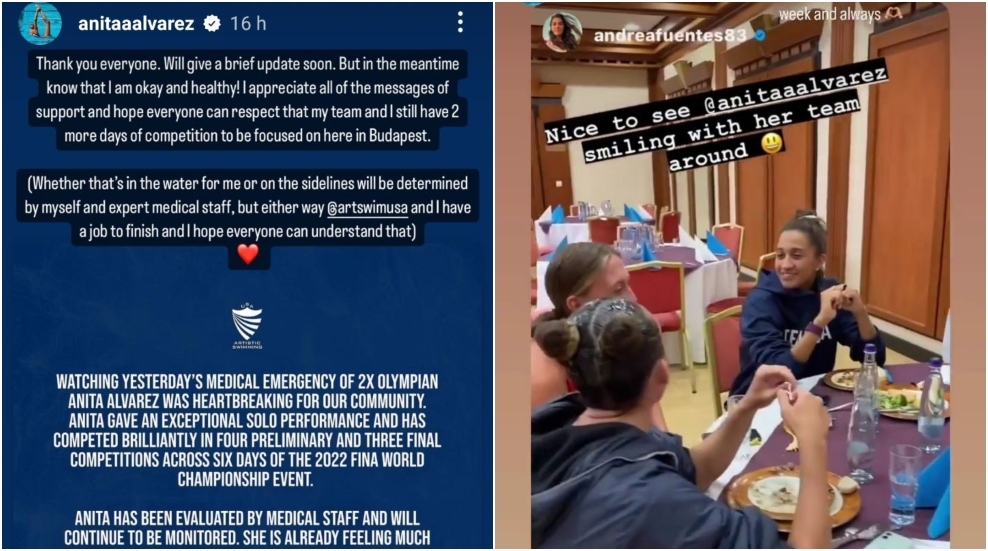
Speaking alongside Fuentes to US outlet NBC, Alvarez described how she had felt “great” during her routine before losing consciousness at the end.
“I was like give everything until the very end and I did that and then I remember going down and just being like, kind of like, ‘uh-oh, I don’t feel too great. And that’s literally the last thing I remember actually,” said the swimmer as she paid tribute to the actions of her coach.
Alvarez finished seventh in an event won by Japan’s Yukiko Inui. The usually all-conquering Russian team featuring stars such as Shishkina and Chigireva have been banned by FINA from this year’s World Championships due to the conflict in Ukraine, forcing them to follow the action from afar.
